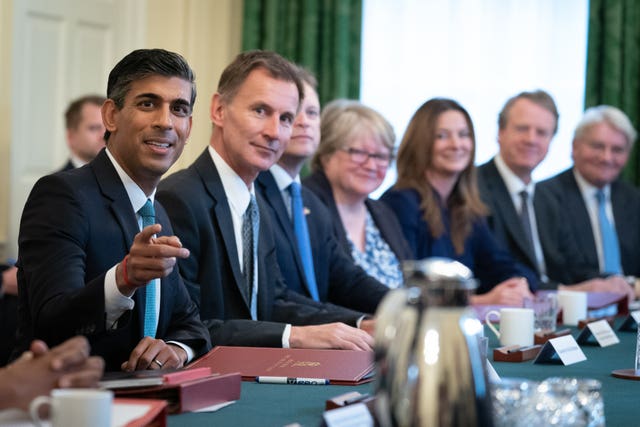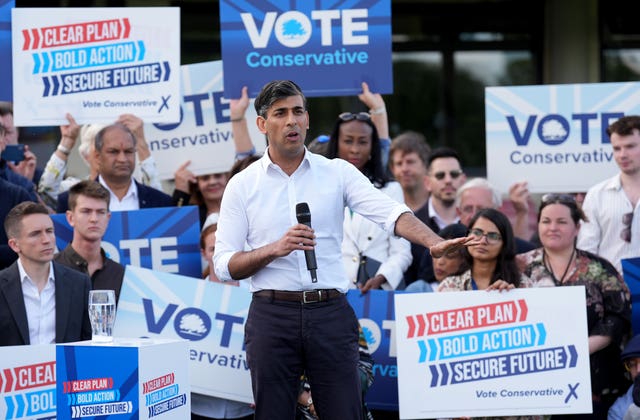Rishi Sunak, the stopgap prime minister who failed to turn around Tory fortunes
During his 20 months in No 10, the premier grappled with a toxic inheritance.

When Rishi Sunak emerged into a rain-drenched Downing Street to announce he was calling an election he began by recalling the moment four years earlier when he unveiled his unprecedented furlough scheme to protect millions of jobs through the Covid pandemic.
It was a telling choice. The then 39-year-old chancellor had barely been in the post a month, but he radiated a calm reassurance as he told a public desperately worried as to how they would make ends meet as the country went into lockdown: “You will not face this alone.”
Nothing, however, that he was to do subsequently was to resonate as profoundly with voters as that moment when the nation faced arguably its darkest hour since the Second World War.
When he did ascend to the top job some two and a half years later – becoming the UK’s first non-white premier – it was against a political backdrop which had changed dramatically.
Mr Johnson had been swept away amid a tidal wave of disgust over revelations of drunken partying in No 10 during lockdown while the rest of the country stoically obeyed the order to stay home.

For the new prime minister, the task was obvious – restore stability while rebuilding trust in government and public institutions shaken by the multiple scandals of the Johnson years.
In the interim, however, his golden boy image had suffered, with disclosures that he had retained a US green card, entitling him to permanent residence in the States, while his wife, the daughter of India’s sixth richest man, had “non dom” status for tax purposes.

While his entry to No 10 did indeed bring some welcome stability, the respite was brief as he grappled with a toxic inheritance of squeezed living standards, over-stretched public services and a Tory Party still at war with itself in the aftermath of Brexit.
His technocratic approach was exemplified in his “five pledges”- presented rather in the manner of a company chief executive setting out his business plan to the board – covering the economy, the NHS and illegal migration.
While his practice of identifying a problem and then applying himself methodically to finding a solution may have served him well in his business career before entering Parliament, delivering in government proved altogether trickier as outside factors crowded in.
A promise to cut NHS waiting lists was hit by the long-running doctors’ pay dispute, inflation remained stubbornly above target until almost the end meaning interest rates also stayed high, while he was unable to stop the migrant small boats crossing the Channel.
His failure to get the much-hyped migrant deportation flights to Rwanda off the ground was a source of particular angst among Tory MPs, stoking demands for him to pull out of the European Convention on Human Rights.

Having been installed as leader without a vote after Mr Johnson abandoned plans for an unlikely comeback, he struggled to win over the party, both in Parliament and in the country at large, with some unable to embrace him as one of their own.
Some could not forgive his role in Mr Johnson’s downfall – his resignation after one scandal too many helping to trigger the rush of ministers heading for the exit door.
At Westminster he had to endure MPs and former advisers on the right plotting almost semi-publicly to replace him while Nigel Farage taunted from the sidelines that he was not a true conservative.
His decision to call the election for July, when most had expected him to wait for the autumn in the hope the economy would pick up, appeared to be a gamble.

Nothing, however, appeared to shift the dial – and the campaign was marked by some serious missteps, most notably his early departure from the D-Day 80th anniversary commemorations in Normandy to do a television interview.
He faced derision when asked if he had ever had to go without things as a child, he replied Sky TV.
To his critics, it was proof that he was never up to the task of leading the country: his supporters would argue that he faced a near impossible task in turning round the party’s fortunes after all the turmoil of the preceding years.
At times he appeared almost resigned to his fate, in one interview making a rare reference to his Hindu faith with its concept of “dharma” or doing your duty.
“You do it because it’s the right thing to do and you detach yourself from the outcome of it,” he told The Sunday Times. “Work as hard as you can, do what you believe is right, and try, and what will be will be.”
As he now contemplates a future away from high office, the question is whether history will judge his 20 months in No 10 as anything more than a footnote to 14 years of Tory rule.





